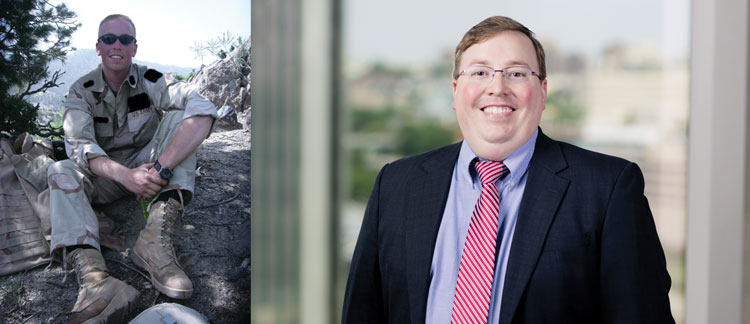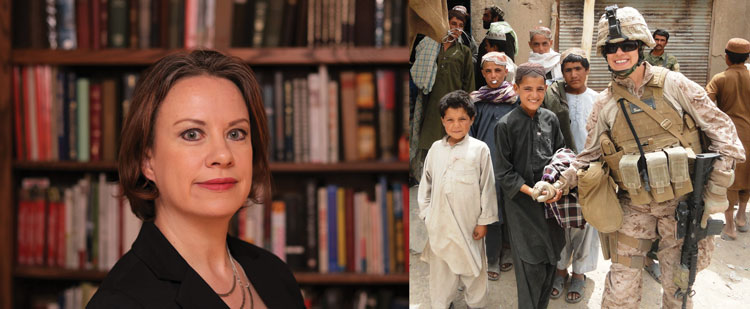Attorneys lend skills to help current and former service members

Timothy McHugh
When attorney Timothy L. McHugh, a retired Army paratrooper, meets with a veteran to discuss a frustrating medical benefits issue or a confounding GI Bill problem, he can relate.
For McHugh, who co-chairs the Veterans Pro Bono Program at Hunton Andrews Kurth in Richmond, Virginia, his own experience as an enlisted soldier gives him insight into the tribulations veterans and service members can face.
When he left the Army after two tours in Iraq and one in Afghanistan, he had to make sure he got U.S. Department of Veteran Affairs compensation to get hearing aids for his blown eardrum. When he returned to college, he had to carefully manage his GI Bill funds to save enough money for law school. “I had to navigate VA stuff on my own while still being in college,” McHugh says. “It was a trial by fire. I figured that out pretty quick.”
He says that experience is partly why he became a lawyer.
“I thought, how are other veterans, particularly those dealing with significant health issues, supposed to figure this out and persevere through the system repeatedly telling them no? I knew then that I wanted to help veterans in their legal fights against the system.”
Now an attorney focused on environmental regulation, McHugh represents clients in enforcement actions and rule-makings. Being able to wade through complex government regulations helps with pro bono veterans work.
One of his current cases, Rudisill v. Wilkie, a fight over how GI Bill benefits should be calculated, went before the U.S. Court of Appeals for the Federal Circuit in December and is being watched for its potential impact on educational payments for some of the nation’s longest-serving veterans. Plaintiff Jim Rudisill, a decorated combat veteran who served two separate periods in the Army, argued that the way the VA calculated his use of two different GI Bills shorted him 12 months of expected educational benefits.
It’s estimated that 1.7 million veterans could be in a similar situation, with their collective benefits worth potentially billions of dollars.
McHugh is one of thousands of attorneys nationwide who volunteer to help active-duty service members or veterans with legal problems that range from consumer disputes and family law matters to complicated issues involving medical and college benefits. Some are veterans themselves; others just want to give back to current and former service members, many of whom have little income. And active-duty members may be stationed far from a courtroom and doing dangerous work.
Those who assist them say the clients are grateful to have someone guiding them.
“I think you will never find a client that is more appreciative of your time and effort than a veteran,” says Aniela Szymanski, senior director for legal affairs and military policy at Veterans Education Success, a nonprofit that provides free legal help and advocacy work.
Szymanski, a Marine Corps reservist herself, says typical GI Bill cases include a vet getting a surprise bill from his or her college at graduation or finding out the VA made an overpayment and is clawing back thousands of dollars.

Photos of Aniela Szymanski courtesy of Stephanie Zimmerman
Veterans often feel helpless trying to navigate the government bureaucracy, she says. “A lot of times, they don’t even understand how to go about getting the error corrected.”
Veterans Education Success and another nonprofit, the National Veterans Legal Services Program, filed a joint amicus brief in Rudisill v. Wilkie, the pro bono GI Bill case McHugh and co-counsel David J. DePippo have worked on for the past five years.
It went from the VA’s Board of Veterans’ Appeals to the U.S. Court of Appeals for Veterans Claims—which ruled in Rudisill’s favor—then on to the U.S. Court of Appeals for the Federal Circuit for the government’s appeal, with a decision expected this spring.
The case is one of about 50 active veterans cases that McHugh’s firm handles in any given year.
DePippo used to work with McHugh at Hunton Andrews Kurth; he’s now senior counsel for Dominion Energy. The retired Coast Guard quartermaster has seen cases in which veterans got no disability benefits even though they had a service-related injury—or instances when they received greatly reduced benefits because of a disability rating mistake. Other vets have difficulty transferring GI Bill benefits to their dependents, leaving teenagers without any college money. “It’s giving people an opportunity to get a really good start,” DePippo says of the pro bono work. “It frees people up to do so many more things. I like that part.”
Access to justice for veterans and service members is complicated by deployments and lack of funds
Numerous organizations work with law firms to pair volunteer attorneys with service members or vets who need help. One is the ABA Military Pro Bono Project, part of the ABA Military and Veterans Legal Center.
“We’re really helping with filling a gap in access to justice,” says Mary C. Meixner, director of the center and counsel for the ABA Standing Committee on Legal Assistance for Military Personnel. The pro bono project matches volunteer attorneys with service members referred by officers in the Judge Advocate General’s Corps, or JAGs. Another program, Operation Stand-By, connects military attorneys with civilian attorneys who can share expertise.
Meixner says military families frequently move and often don’t have the money to hire private attorneys.
An ABA volunteer, Patrick J. Hughes, co-founder of the Patriots Law Group in Maryland and Virginia, recently helped a service member whose lender got a garnishment that froze the man’s bank account. The service member was stationed in Wisconsin; the dispute was in Maryland, and he couldn’t pay his rent.
Hughes, who served six years as a JAG in the Air Force, says enlisted personnel encounter the same legal troubles as anyone else—a landlord not returning a security deposit or an issue with child support—but often don’t have the funds to hire a lawyer or may not be able to come to court, especially if they’re posted far away.
“As lawyers, we have a particular duty to provide pro bono legal services,” Hughes says. “It really helps that I can speak their language.”
The National Veterans Legal Services Program also handles pro bono cases and far-reaching class actions. The group famously won a 1991 consent decree in Nehmer v. U.S. Department of Veterans Affairs, which resulted in billions in retroactive disability and death benefits for Agent Orange-exposed Vietnam veterans and their families.
The group’s Lawyers Serving Warriors program matches individual vets with private law firms and corporate legal departments willing to donate services. It also provides lawyer trainings.
Barton F. Stichman, NVLSP co-founder and executive director, says the pro bono cases run the gamut. Some are veterans who were wrongly discharged for a “personality disorder” when they actually had PTSD. Or they survived military sexual trauma but were locked out of disability benefits despite having post-traumatic stress disorder and depression.
In such cases, an attorney can help fix the veteran’s record and then follow up with the VA to ensure proper benefits go through.
Civilian lawyers are also lending a hand
Not all the lawyers who step up for veterans and service members have worn a uniform.
David R. Seligman, a partner at Kirkland & Ellis in Chicago, is an expert in corporate restructurings and insolvency proceedings who uses his knowledge of bankruptcy and debtor rights to help veterans with alleged VA debts.
Seligman sees his pro bono work as gathering documentation, figuring out whether the VA made an error and coming up with a strategy—whether to challenge the original decision, reduce the debt or arrange a favorable payment plan.
“There’s a special feeling when you’re able to help those who’ve sacrificed their time and potentially put themselves in harm’s way for our country.”
McHugh agrees that the pro bono work is rewarding, not only for the legal challenges but also for the impact it has on the lives of those who’ve served. Whether it’s helping a veteran who got money for college or a service member who wins a military sexual trauma case and finally gets “an acknowledgment that ‘you were right’; they believe you”—the legal work is infused with the same camaraderie he experienced in the service.
“You take care of your people,” he says. “You take care of your soldiers. You put their interests ahead of your own, and you carry that with you forever.”
This story was originally published in the April/May 2021 issue of the ABA Journal under the headline: “Veteran Lawyers: Attorneys lend skills to help current and former service members.”



